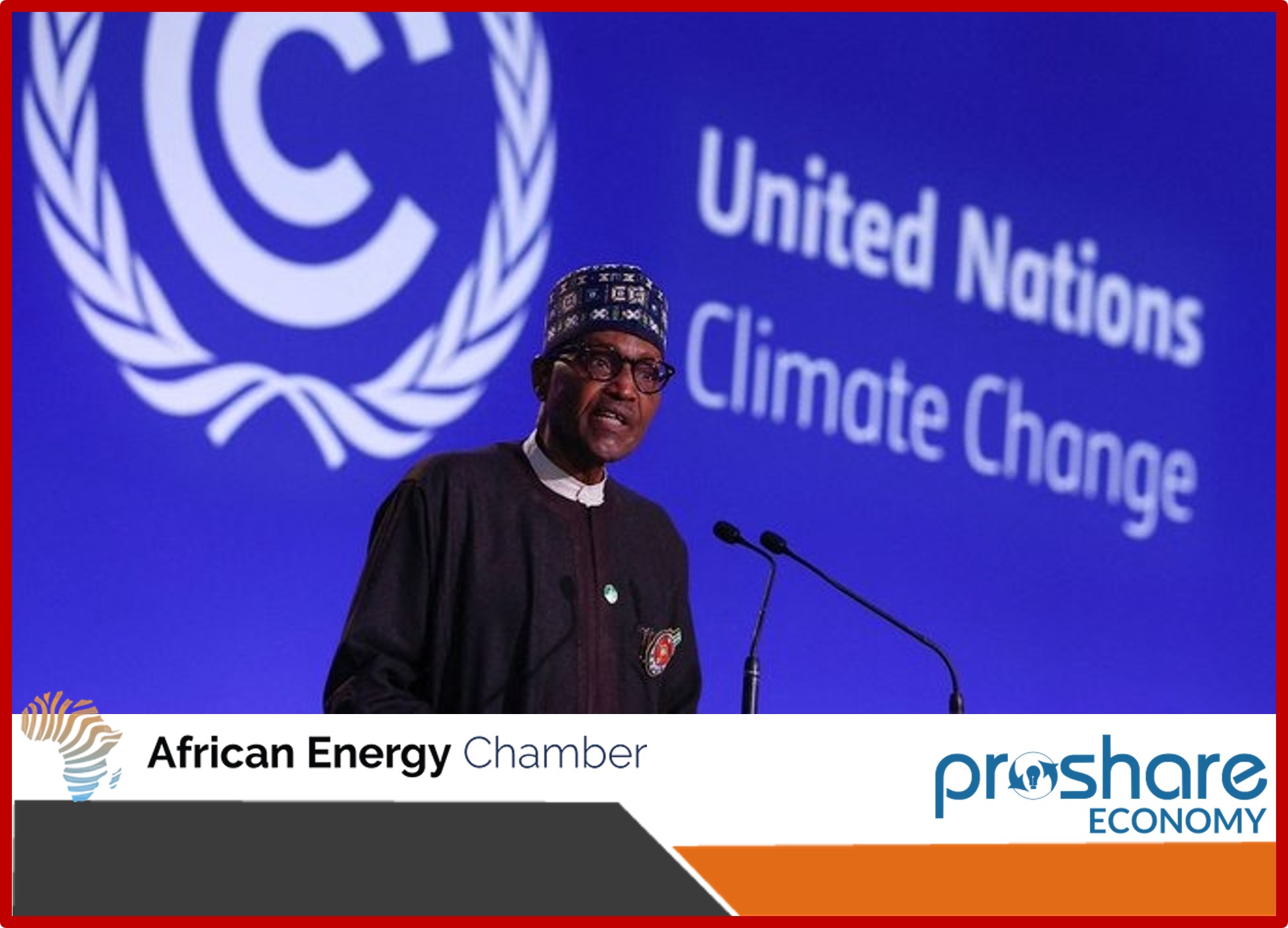Wednesday, November 03, 2021 / 2:29PM / by NJ Ayuk, African Energy Chamber / Header Image Credit: COP26
Our countries rely on oil production for revenue andjobs, and natural gas is still an important means of reducing energy poverty.
As we approach the end of 2021 and COP26, the Africanoil and gas industry is in a precarious position.
As if the economic devastation of the pandemic weren'tenough, we're also faced with increasing pressure to reduce our production offossil fuels and move toward renewables. Many of the majors are beginningto divest from African oil and gas projects because of the issues emergingaround the energy transition.
But oil and gas remain critically important to meetAfrica's economic and energy needs, and that need is greater than ever. Ourcountries rely on oil production for revenue and jobs, and natural gas is stillan important means of reducing energy poverty. It's also essential tobuild much-needed infrastructure so we can industrialize and diversify oureconomies.
We face challenges on all sides. Our economic survivaldepends on a thriving, strategically managed oil and gas industry, and Africangovernments must act now to protect our industry and our future.
The Clock is Ticking
The African Energy Chamber recently released our 2022Outlook outlining the industry forecast for next year and beyond. While thereport indicates signs of recovery, it also signals the need for Africangovernments to step up their efforts to ensure the health and longevity of ourindustry - and the need for even more immediate and decisive action in thepost-pandemic environment. If our oil and gas industry is to deliver thebenefits of a just energy transition to the African people, our governmentsmust move quickly.
The AEC report brings new urgency to the issues thathave plagued our industry for decades. I've written at length about the need toreform our fiscal policies and regulatory structures. This includes betterdeal-making, retooling ineffective regulations, and putting an end tocorruption, human rights abuses, and resource nationalism. And in thepost-pandemic environment, it's even more critical that we adjust our dealstructuring to account for the higher perceived risk of doing business inAfrica.
Signs of Recovery
There's still time for African governments to take thelead and reshape our future. The 2022 Outlook highlights some positiveindicators for the period ahead. But the window of opportunity is small,and we must take advantage of every upward trend.
2021 saw crude prices begin to recover and stabilizewell above the historic lows of 2020. Several major projects have beensanctioned, including the Eni-operated Cuica field in Angola, the TotalEnergies-operated Tilenga project onshore Uganda, the Chevron-operated Sanhalean gas development, and the CNOOC-operated Kingfisher South project. Thatactivity helped maintain African capital expenditures at an estimated USD33billion, slightly above the year-end 2020 estimates.
Rig demand, another growth indicator, is expected torebound significantly beginning in 2022 as higher oil price expectation helpsto revive exploration activity and drilling programs for projects currently indevelopment get underway. Based on the oil price outlook presented in thereport, the combined potential of these new projects and further explorationactivity will help propel demand back toward pre-pandemic levels.
Gas-to-power remains a huge - and still growing - areaof opportunity. Gas supply and demand are forecast to recover after thesharp 2020 decline, and LNG demand is expected to grow at a healthy CAGR of 5%.
All these point to the start of a new cycle ofrecovery and growth. That said, however, the pandemic caused unprecedentedmarket turmoil, and its impact on our industry will have far-reaching effectsfor years to come. We have a long recovery ahead and a host of issues tocontend with.
A New Set of Challenges
The AEC report estimates that COVID-19 will have costAfrica nearly USD150 billion in exploration and development expenditure between2020 and 2025. Clearly, the need for action is urgent.
One of the biggest challenges facing our industry isthe decline in capital spending. Capital expenditure was already trending downwardas we entered 2020. Even before the pandemic, new project activity wasslowing because of general cost compression and the difficulty of getting newprojects sanctioned. With COVID deferring investment decisions on manyprojects, capital expenditure is expected to remain low through 2025.
Upstream exploration also took a big hit. 2020-2021discoveries were the lowest in a decade. The upstream outlook for 2022 is moreencouraging, with 13 new high-impact wells anticipated. But with crudeprices not expected to rebound until 2023, projects will continue to bedeferred or deemed commercially unviable, limiting our growth potential. Themajors' upstream investments are expected to decline 2022-2025 by about USD34billion compared to year-end 2020 estimates.
It's Time to Push Harder
While the AEC report forecasts some modest improvementfor 2022, the message is clear: African governments must move swiftly to ensurethat the arc of our energy transition bends in the right direction. With accessto electricity at only 56% of the African continent - and at less than 40% inmore than a dozen countries - our top priority remains achieving universalaccess to energy. This is the foundation of economic empowerment for allAfricans and our larger mission.
Specifically, as NOCs and IOCs struggle to regaintheir post-pandemic footing, we need to prioritize oil and gas development byoptimizing the conditions for investment and partnership. We can't fallvictim to the foot-dragging and red tape that has hindered our progress in thepast. We must continue our drive for amended policies, restructured regulatoryframeworks, and investor initiatives that improve the conditions for doingbusiness in Africa.
What's Our Game Plan?
Let's look at the actions African governments can andshould take to protect our oil and gas industry.
For one thing, we should be making better use oftechnology. We're living in the most technologically advanced era in humanhistory, but the African oil and gas industry has failed to utilize digitalsolutions effectively. We should be using 21st-century solutions to solve21st-century problems.
A good place to start our digital transformation iswith licensing rounds. After a 2019 uptick in licensing activity, severalrounds in 2020-2021 were delayed or canceled altogether in the wake of thepandemic. I've advocated for revamping licensing rounds for some time now, andthe need for reform is even more pressing in the post-pandemic environment. Theglacial pace of our bureaucratic, paper-laden process continues to hold usback. We can generate more exploration faster with a more streamlined system,but that demands the ability to process data much more quickly.
Yes, technology requires an investment. Mostworthwhile ventures do. But if that investment rewards us with more explorationand development, it's well worth making. We're already late to the party, andour failure to adopt digital solutions has hurt our progress. We can't affordto wait any longer.
We should also make sure we're doing everything we canto ensure contingent investment. The AEC report projects capital spending tostay relatively flat in 2022–2023, with any 2024-2025 growth expected to comefrom contingent expenditure. Rig demand is one growth indicator, as I've said,and it's often tied to contingent resources and, as a result, sensitive toinvestment decisions expected in the next few years. In Angola alone, forexample, about 45% of rig demand is related to contingent resources. Regulatoryauthorities should expedite projects to provide longer-term visibility onfuture production volumes so we can realize that revenue, which the AECestimates at up to $40 billion.
Reducing project breakevens is another important waywe can sustain and generate development. In the wake of COVID, manyoperators delayed projects with high breakeven crude prices. When oil pricescrashed to below $35 per barrel, it had a drastic impact on economic forecastssince many projects were planned assuming a price of $55-$60 per barrel.
Subsea tiebacks are one of the best ways to achievemore competitive project breakevens. Connecting new discoveries to existingproduction centers is an obvious development solution. The AEC reports thatsubsea tiebacks will be the largest category of investment through 2025. Weshould prioritize the use of subsea tiebacks to reduce breakevens and protectmore revenue.
Gas-to-power continues to be a huge and growingopportunity for Africa. The 2022 Outlook reports that LNG will dominate ourindustry well into 2025. But we have to do a better job of incentivizingthat activity. As the majors continue to shift away from crude oil andtoward monetizing gas, we need to incentivize gas projects as proactively as wedo oil exploration and production. Specifically, this means revising our PSCsto provide more favorable terms to investors. Most African countries currentlyhave oil-based regulations or production contacts that don't also includeprovisions for gas. Clear regulations are essential for us to achievewidespread distribution of natural gas and construction of gas-to-powerfacilities.
None of this is optional. All the measures I'veoutlined are crucial to minimize our losses and optimize the conditions forgrowth as we move into 2022. It's not a question of if, but of how quickly wecan put these reforms in place.
The Future is Now, andIt's Up to Us
Africa's future depends on sustaining the longevity ofour oil and gas industry. As we emerge from the pandemic, the need for actionis even more urgent. African governments must take strategic, decisive,and immediate steps to protect and reform our industry.
It's our responsibility to ensure that our energytransition benefits Africa and our people, and the time to act is now.
About the Author
NJ Ayuk is the Executive Chairman of the AfricanEnergy Chamber
Related News
- Don't Hold Your Breath for a Breakthrough at COP26 - OIR 021121
- AELEX Petroleum Industry Act Articles Series: Funds Created Under The PIA (Part 1)
- The End of a Remarkable Rally in Energy Prices - OIR 291021
- What Does International Oil Companies Divestiture Mean for Africa and for Climate Initiatives?
- The Subsidy Debate: Between the Devil and Deep Blue Sea
- The Oil Bulls Are Running Riot - OIR 261021
- Oil Prices Extend Gains Amid Tight Supply
- Is $85 the New Normal for Oil Markets? - OIR 221021
- Oando Plc Group Chief Executive to Promote the Role of Indigenous Energy Companies at AEW 2021
- Japan Asks OPEC for More Oil
- Oil Prices Remain Elevated as The Energy Crunch Worsens - OIR 191021
- FG Scraps DPR, PPPRA, PEF for New Agencies
- Oil Markets Unfazed By Falling Imports From China - OIR 151021
- OPEC Monthly Market Report: Nigeria Reports Marginal Production Uptick in September 2021
 Lagos, NG • GMT +1
Lagos, NG • GMT +1











 2001 views
2001 views










 Sponsored Ad
Sponsored Ad
 Advertise with Us
Advertise with Us









